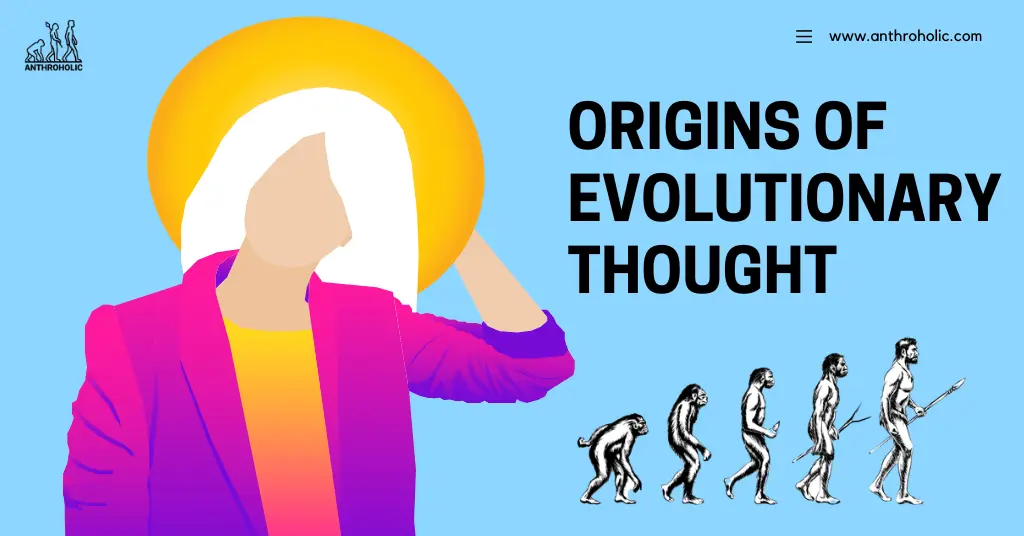AI Answer Evaluation Platform Live Now. Try Free Answer Evaluation Now
Origins of Evolutionary Thought
The concept of evolution, or the gradual transformation of species over generations, is an integral part of modern biological thought. Evolutionary theory informs every aspect of biological research, from ecology to genetics, and has profound implications for our understanding of life on Earth. But how did these ideas emerge and evolve themselves? Let’s explore the historical origins of evolutionary thought.

Pre-Darwinian Evolutionary Ideas
Ancient and Medieval Thoughts
The earliest hints of evolutionary thought can be traced back to ancient civilizations. For instance:
- The Greeks: Anaximander (610-546 BC) proposed that humans originated from other forms of life, specifically aquatic creatures1.
- The Romans: Lucretius (99-55 BC) espoused the concept of survival of the fittest, a precursor to natural selection2.
However, these ideas lacked systematic development and were mostly philosophical speculations, not empirical theories.
Enlightenment Era: A Paradigm Shift
During the Enlightenment era, several thinkers laid the foundation for a more systematic understanding of evolution.
- Georges-Louis Leclerc, Comte de Buffon (1707-1788): He suggested that species could change over time and adapt to their environments3.
- Jean-Baptiste Lamarck (1744-1829): Known for his theory of “inheritance of acquired characteristics,” Lamarck proposed that organisms could adapt during their lifetimes and pass these traits to their offspring4.
Despite these strides, a cohesive theory of evolution was still lacking.
Charles Darwin and the Theory of Natural Selection
In the mid-19th century, Charles Darwin (1809-1882) and Alfred Russel Wallace (1823-1913) independently conceived the theory of evolution by natural selection5.
Darwin, in particular, is celebrated for his comprehensive elaboration of the theory. His landmark book, “On the Origin of Species” (1859), laid out compelling evidence for evolution, detailing his observations from his voyage aboard the HMS Beagle and his subsequent research.
- Darwin’s postulates: The foundation of Darwin’s theory lies in four essential principles:
- Variation: Within species, individuals vary in traits.
- Inheritance: Traits are inheritable from parents to offspring.
- High rate of population growth: More offspring are produced than can survive.
- Differential survival and reproduction: Individuals with advantageous traits are more likely to survive and reproduce6.
Mendelian Genetics and the Modern Synthesis
The late 19th and early 20th century saw significant developments in understanding heredity, which greatly influenced evolutionary theory.
Gregor Mendel and Heredity
Gregor Mendel’s (1822-1884) experiments on pea plants revealed the principles of genetic inheritance, providing a mechanistic basis for the inherited variation central to Darwin’s theory7.
The Modern Synthesis
By the mid-20th century, researchers had begun to merge Mendelian genetics with Darwinian evolution in an intellectual fusion known as the “Modern Synthesis.” Key figures include:
- R.A. Fisher (1890-1962), J.B.S. Haldane (1892-1964), and Sewall Wright (1889-1988): These scientists integrated genetics into evolutionary theory8.
- Julian Huxley (1887-1975): He popularized the term “Modern Synthesis” and argued that all evolutionary phenomena could be explained through genetic variation and natural selection9.
The Modern Synthesis remains the backbone of modern evolutionary biology.
Conclusion
The origins of evolutionary thought are as complex and intricate as the process of evolution itself. It has seen significant development from ancient musings to the modern understanding that encompasses intricate genetic details. Our understanding of evolution continues to evolve, revealing more about the intricate processes that have shaped life on Earth.
References
[1] Laërtius, D. (1925). Lives of the Eminent Philosophers. Harvard University Press.
[2] Smith, M. F. (2001). Lucretius: On the Nature of Things. Hackett Publishing.
[3] Roger, J. (1997). Buffon: A Life in Natural History. Cornell University Press.
[4] Burkhardt, R. W. (2013). Lamarck, Evolution, and the Inheritance of Acquired Characters. Genetics, 194(4), 793–805. https://doi.org/10.1534/genetics.113.151852
[5] Browne, E. (2002). Charles Darwin: The Power of Place. Princeton University Press.
[6] Darwin, C. (1859). On the Origin of Species. John Murray.
[7] Mendel, G. (1866). Experiments on Plant Hybridization. Verhandlungen des naturforschenden Vereines in Brünn, Bd. IV für das Jahr, 3–47.
[8] Provine, W. B. (2001). The Origins of Theoretical Population Genetics. University of Chicago Press.
[9] Huxley, J. (1942). Evolution: The Modern Synthesis. Allen & Unwin.



